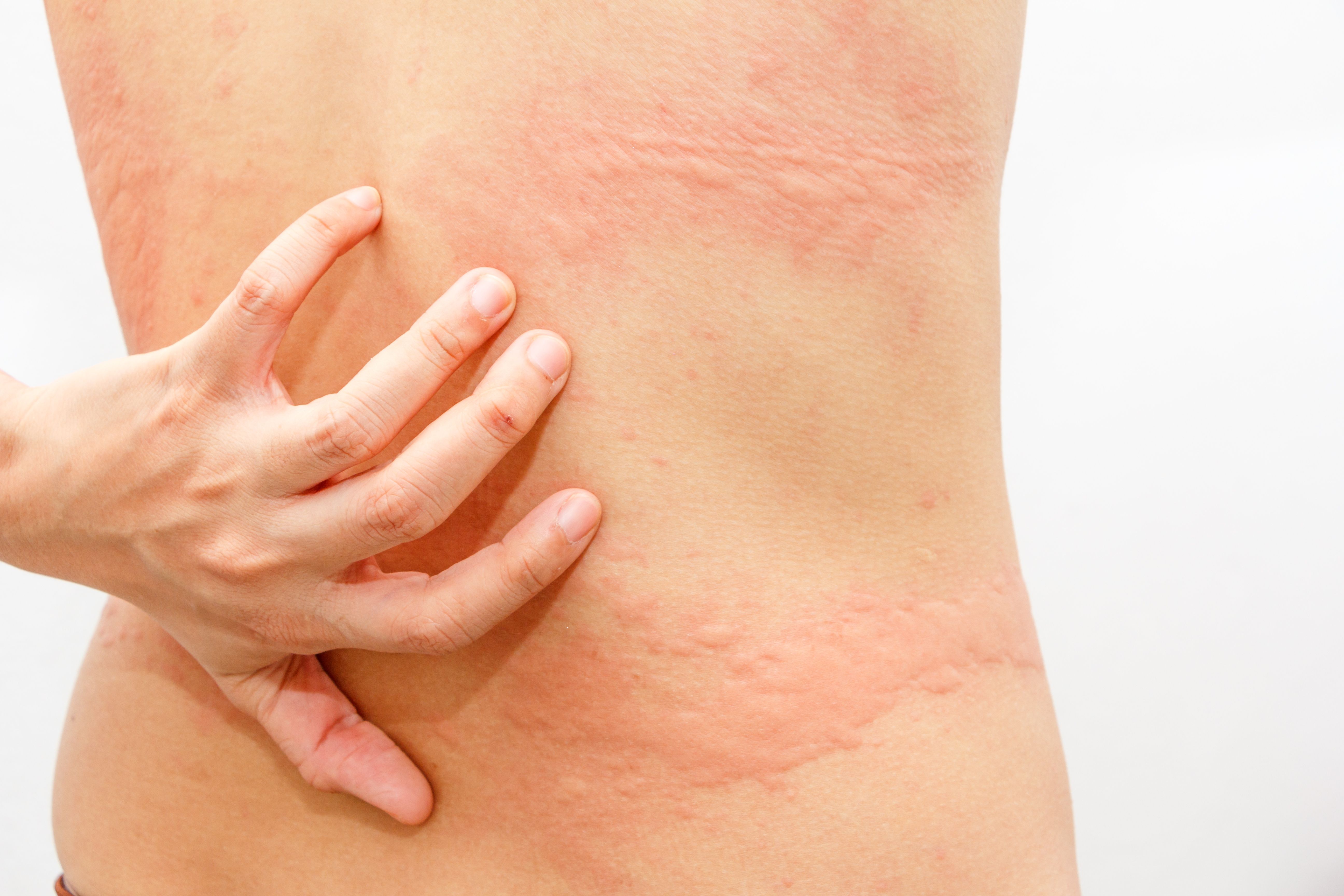News
Article
Researchers Announce Positive Trial Data for the Use of Remibrutinib In Chronic Spontaneous Urticaria
Author(s):
Individuals treated with remibrutinib demonstrated symptom control improvement in week 2 of the trial
The oral Bruton tyrosine kinase inhibitor (BTKi) remibrutinib (Novartis), displayed positive data from the Phase III REMIX-1 and REMIX-2 studies among individuals with chronic spontaneous urticaria (CSU) with symptoms that were ineffectively controlled by H1-antihisamines. Presented at the American College of Asthma, Allergy and Immunology (ACAAI) Scientific Meeting, remibrutinib met all primary and secondary endpoints in both studies.
Women with symptoms of itchy urticaria.- Image credit: Kanachaifoto | stock.adobe.com

CSU is a condition in which unexpected itchy hives (wheals) and/or deep tissue swelling appears on the face, throat, hands, and feet that is present for more than 6 weeks. The disorder is reported to impact 40 million people worldwide, most of whom are 20 to 40 years old, and women are affected twice more than men. CSU is reported to cause emotional distress, sleep deprivation, anxiety, depression, and impacted work productivity.
“Patients with CSU have limited treatment options and many patients do not respond to antihistamines even at higher than approved doses, leaving them with uncontrolled symptoms and potential side effects such as drowsiness,” said Angelika Jahreis, Global Head of Development, Immunology at Novartis, in a press release. “We are committed to developing new therapies for patients with immuno-dermatologic disorders and are excited about the prospect to provide a potential new option for patients with CSU who suffer from relentless itch and a life filled with limitations. These data show that remibrutinib, an oral BTKi, provided significant symptom improvement as early as Week 2 and sustained up to Week 12.”
Remibrutinib offers an additional treatment method for CSU because the oral BTK inhibitor can block the BTK cascade to “prevent the release of histamine that causes wheals and swelling.”
Researchers assessed the use of remibrutinib in the REMIX-1 (NCT05030311) and REMIX-2 (NCT05032157) identically designed global, multicenter, randomized, double-blind, parallel-group, placebo-controlled phase 3 studies. The REMIX-1 study included 470 individuals and the REMIX-2 study included 455 individuals.
The study authors noted that the researchers analyzed the efficacy, safety, and tolerability among individuals that received 25 mg of remibrutinib, twice daily, compared to a placebo.
The results found that most individuals achieved well-controlled disease (UAS7-6) at week 2 throughout week 12 when treated with remibrutinib, compared to the placebo. By week 12, one-third of individuals reported a lack of itch and hives.
“These findings could be significant for the millions of people who suffer from CSU and are still symptomatic,” said Marcus Maurer, MD, Professor of Dermatology and Allergy, Executive Director of the Institute of Allergology at Charité – Universitätsmedizin Berlin and Co-Director of Allergy and Immunology at the Fraunhofer Institute for Translational Medicine and Pharmacology, in a press release. “Living with CSU can be very distressing, often impacting many aspects of people’s lives such as sleep and ability to work. Having another option that could potentially provide effective relief as early as 2 weeks after trying antihistamines alone could be transformative for these patients.”
The study authors noted that remibrutinib also displayed positive tolerability and safety with fewer adverse event rates, compared to the placebo. Specifically, 64% of individuals treated with remibrutinib experienced adverse events and infection, compared to 64.7% among individuals treated with placebo. Additionally, 32.8% of individuals treated remibrutinib experienced liver function test abnormalities, compared to 34% among individuals treated with placebo.
The study authors noted that the individuals included in the trial will receive treatment until week 52 and then will have the option to receive long-term treatment through the extension trial. However, Novartis announced that they intend to propose the approval of remibrutinib in 2024 for treatment in individuals with CSU.
Reference
Novartis data show potential of remibrutinib as an oral treatment for chronic spontaneous urticaria providing significant symptom improvement as early as Week 2. Novartis. News release. November 9, 2023. Accessed November 28, 2023. https://www.novartis.com/news/media-releases/novartis-data-show-potential-remibrutinib-oral-treatment-chronic-spontaneous-urticaria-providing-significant-symptom-improvement-early-week-2.
Newsletter
Stay informed on drug updates, treatment guidelines, and pharmacy practice trends—subscribe to Pharmacy Times for weekly clinical insights.





